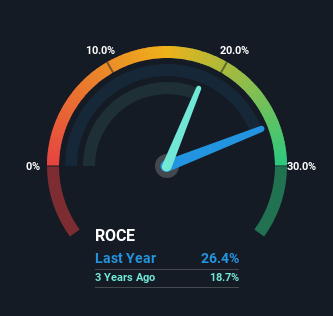- India
- /
- Electrical
- /
- NSEI:POLYCAB
Many Would Be Envious Of Polycab India's (NSE:POLYCAB) Excellent Returns On Capital

There are a few key trends to look for if we want to identify the next multi-bagger. Firstly, we'd want to identify a growing return on capital employed (ROCE) and then alongside that, an ever-increasing base of capital employed. Ultimately, this demonstrates that it's a business that is reinvesting profits at increasing rates of return. So, when we ran our eye over Polycab India's (NSE:POLYCAB) trend of ROCE, we really liked what we saw.
Understanding Return On Capital Employed (ROCE)
For those who don't know, ROCE is a measure of a company's yearly pre-tax profit (its return), relative to the capital employed in the business. The formula for this calculation on Polycab India is:
Return on Capital Employed = Earnings Before Interest and Tax (EBIT) ÷ (Total Assets - Current Liabilities)
0.26 = ₹22b ÷ (₹121b - ₹36b) (Based on the trailing twelve months to March 2024).
Therefore, Polycab India has an ROCE of 26%. That's a fantastic return and not only that, it outpaces the average of 18% earned by companies in a similar industry.
Check out our latest analysis for Polycab India

Above you can see how the current ROCE for Polycab India compares to its prior returns on capital, but there's only so much you can tell from the past. If you'd like to see what analysts are forecasting going forward, you should check out our free analyst report for Polycab India .
What The Trend Of ROCE Can Tell Us
It's hard not to be impressed by Polycab India's returns on capital. Over the past five years, ROCE has remained relatively flat at around 26% and the business has deployed 182% more capital into its operations. Returns like this are the envy of most businesses and given it has repeatedly reinvested at these rates, that's even better. If these trends can continue, it wouldn't surprise us if the company became a multi-bagger.
On a side note, Polycab India has done well to reduce current liabilities to 30% of total assets over the last five years. This can eliminate some of the risks inherent in the operations because the business has less outstanding obligations to their suppliers and or short-term creditors than they did previously.
In Conclusion...
In summary, we're delighted to see that Polycab India has been compounding returns by reinvesting at consistently high rates of return, as these are common traits of a multi-bagger. And the stock has done incredibly well with a 1,053% return over the last five years, so long term investors are no doubt ecstatic with that result. So even though the stock might be more "expensive" than it was before, we think the strong fundamentals warrant this stock for further research.
Polycab India does have some risks, we noticed 2 warning signs (and 1 which is significant) we think you should know about.
If you want to search for more stocks that have been earning high returns, check out this free list of stocks with solid balance sheets that are also earning high returns on equity.
New: Manage All Your Stock Portfolios in One Place
We've created the ultimate portfolio companion for stock investors, and it's free.
• Connect an unlimited number of Portfolios and see your total in one currency
• Be alerted to new Warning Signs or Risks via email or mobile
• Track the Fair Value of your stocks
Have feedback on this article? Concerned about the content? Get in touch with us directly. Alternatively, email editorial-team (at) simplywallst.com.
This article by Simply Wall St is general in nature. We provide commentary based on historical data and analyst forecasts only using an unbiased methodology and our articles are not intended to be financial advice. It does not constitute a recommendation to buy or sell any stock, and does not take account of your objectives, or your financial situation. We aim to bring you long-term focused analysis driven by fundamental data. Note that our analysis may not factor in the latest price-sensitive company announcements or qualitative material. Simply Wall St has no position in any stocks mentioned.
About NSEI:POLYCAB
Polycab India
Manufactures and sells wires and cables under the POLYCAB brand in India and internationally.
Flawless balance sheet low.
Similar Companies
Market Insights
Community Narratives



